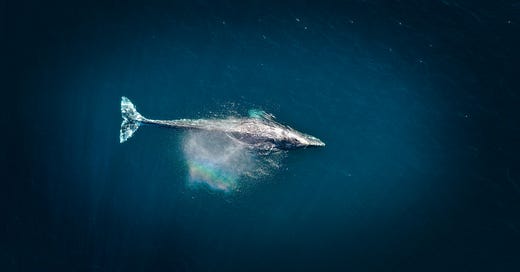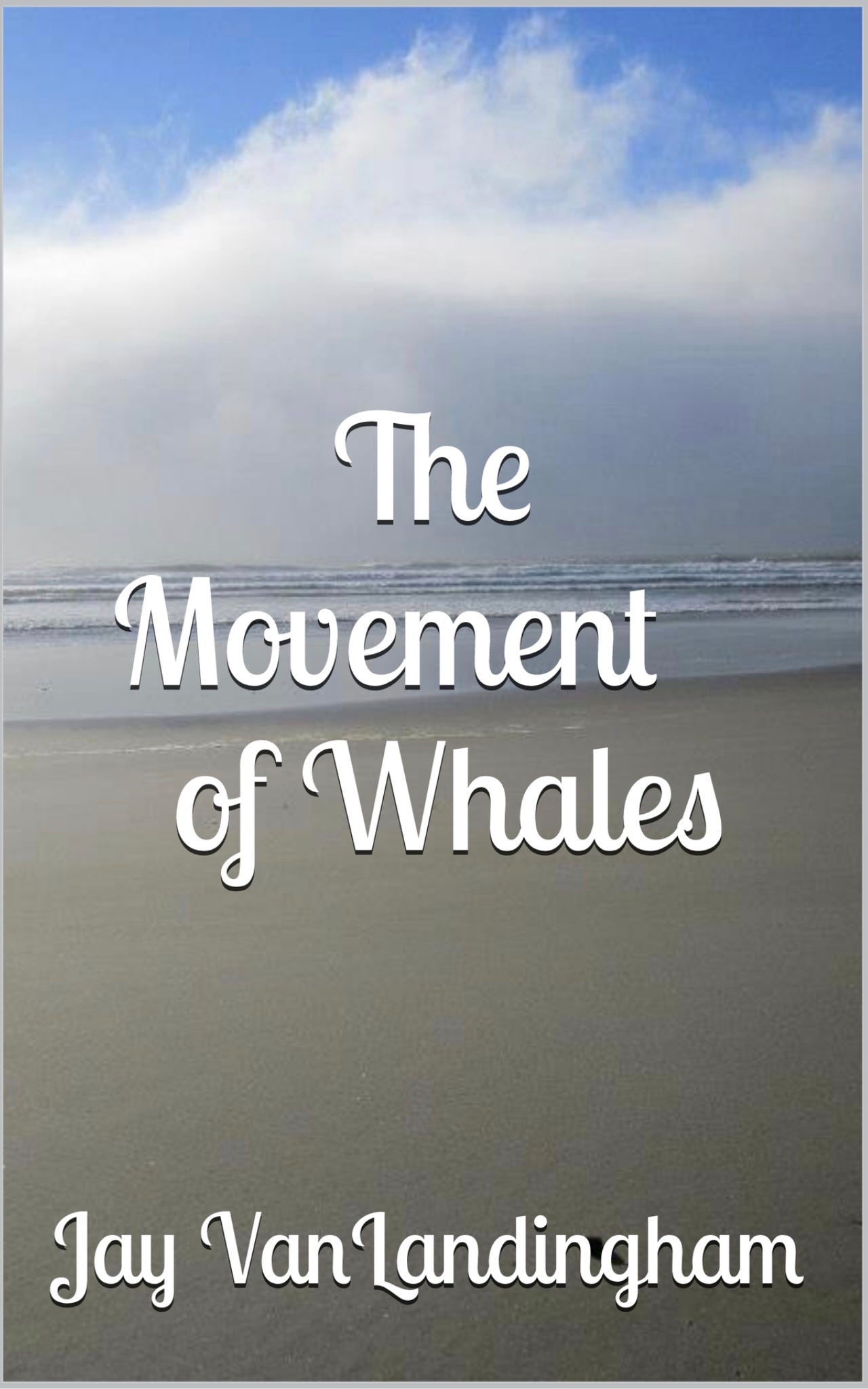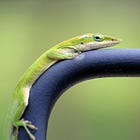Welcome back to another Wizard of Claws interview!
Jay VanLandingham was one of the first vegan fiction authors I ever heard of. I spotted an ad for his dystopian novel, Sentient, in VegNews a few years ago, which I carefully cut out and placed in a folder with similar magazine clippings and scraps of paper on which I’d scrawled book titles. By the time I decided to start doing author interviews, Jay had already released Sentient’s sequel and “The Movement of Whales,” a literary short story that snatched my breath away.
The story follows a teen girl named Charlie who runs away from home to go on a whale-watching tour. After reading it, I needed to talk to Jay about it. I hope we can discuss his Sentient trilogy in the future, but today is all for Charlie.
Questions with potential spoilers have been labeled
General Questions
Can you share a little bit about yourself, including how you came to care about animals and creative writing?
From the time I was a very young child, animals have been a part of my life. At the age of five we lived with my grandmother, who took in every stray cat and dog from the neighborhood, so I am sure it began there. From the age of seven onward our family had pets and I gravitated toward them as some of the best companions I have come to know in life. I think my empathic nature instructed my values of equality with nature…that animals, humans and all of nature stand on equal ground. That hierarchy does not exist. I will also add that I have been a very spiritual person since the age of twelve. In my twenties I began learning about Buddhism, and in particular, remember reading Thich Nhat Hanh’s writings on interconnectedness; that we can sit and notice a plate of food and take a moment to acknowledge where that food came from, that if we are eating animals, we are choosing to bring violence into our bodies and our lives.
I believe that to this day.
And so it’s all wrapped up into one, really. My spirituality and getting to know other vegans made it easier for me to understand why removing harm to animals from my landscape. I went vegan in 2013. At that time in my life, I had been working full-time as a social worker, but it had been my dream to be an author. I’d been writing stories, poetry and books since I was seven. When I was a child, many of the stories I wrote were about my pets. And so it comes to no surprise that about one year after going vegan, I was hit hard in the face with the idea for my Sentient eco-dystopian series, which addresses factory farming and animal rights.
Many of us have childhood dreams of becoming a writer. At what point did you decide to actually go for it?
This happened gradually for me, over the last ten years. But more specifically; when my back was up against the wall and I really had no other choice. Without going into great personal detail, it was in 2021 when a traumatic event changed the entire trajectory of my life. All distractions and reasons for not pursuing my author career were essentially wiped out of my life, and I had nowhere else to go but the writing. So…I sat down at the computer and started dedicating about 20 hours a week to the author career, and haven’t looked back since.
Most animal advocacy focuses on creating tangible changes in the real world. What role can the arts play in changing how people think about animals?
Art has always played a role, to some degree, in social justice issues. With stories in particular, giving readers access to diverse characters with differing viewpoints from their own provides readers with the opportunity to open their minds and look at things differently than they otherwise would in their day-to-day lives. Exposure to novels, poetry, artwork that challenges the norm, that expresses creativity in a new and interesting way, provides an opening less threatening to people than, say, forcing them to watch a video of an animal being slaughtered in real life.
That is just my opinion. Not to say that all animal advocacy isn’t important. I believe the arts can open people to the concept of animal rights in a way that is less traumatic, less threatening.
What does your average day of writing look like? How do you balance writing with your other work and hobbies?
It differs. Despite the fact my second business in social work pays my bills, the writing still comes first in many ways. I am blessed and privileged to be able to work part-time and still pay bills, keeping my expenses very low, because the ultimate priority is the writing. So I am able to spend about twenty-hours a week, between weekends, weekdays and week nights, on my writing.
On one day I may see two-three clients, and then spend another hour to two hours either writing or on marketing/promotion. Hobbies come last, and are typically reserved for certain evenings or Saturdays, so I set a very clear schedule of time for writing outside of when I see my clients.
Can you share a little behind-the-scenes information on how you came to publish this story? Logistically, how did it turn from a document on your computer to an ebook anyone can buy online?
Sure thing! I write everything long-hand, first and foremost. The first draft was written in a fervor over about a two week period of time. From there, I typed it up, read through it, revised it. I gave it to a few friends to beta read for feedback. Once I got the impression from readers and my own sense of the craft that this story was publishable, I first sent it to many literary magazines, but received rejection after rejection. Finally I decided I just wanted the dang thing out there for readers, and I formatted it into an ebook (I use Scrivener). The cover art was a photo I took while on a trip to Oregon I took back in 2012 (which I’ll say more about later). I plopped it all together and uploaded it to Amazon KDP, did a little promotion for it, and the rest is history.
In what ways would you like to see other authors, vegan or not, write about animals, animal activists, and/or animal rights?
I would love to see more authors write animals into books that have more meaningful and inclusive roles in the plot of a story. Books about animals as the main characters, with their own personalities and character arcs, would also be cool. And of course any books about animal activists that provide a realistic representation of what these activists have to endure, on an emotional level, would also be fascinating.
Story Questions
Where did the idea for “The Movement of Whales” come from?
I went on a solo trip to Oregon in 2012. I was in the process of purchasing my first home, and so there was a lot of transition happening in my life at that time. The trip along the Oregon coast had such an impact on me that I knew I wanted to write a story about it. The feeling it gave me, more than anything else. (I’ve always wanted to be a travel writer.) I knew the title was going to be “The Movement of Whales.” I knew vaguely what the subject matter was, but it would be another five years before I actually was ready to sit and write it.
Why whales? Is there any deeper symbolism to Charlie’s love of the species?
Full disclosure: I do not know a whole lot about whales. I chose these fascinating creatures because of my lack of knowledge of them. That they are so mysterious. So much of their lives are hidden beneath a surface that we don’t often delve into to take the time to get to know, for various reasons. And so as a metaphor it made sense to me that often within our own lives and relationships, there are things we won’t delve deeper into, whether it’s past trauma, or asking our friends and people in our lives the deeper questions, whether out of fear or respect or both. So I think the symbolism of her love for the whales is largely unconscious for her. I don’t think she even understands why they elude her. They do in the same way her past and her relationship with her father elude her. They are one in the same.
[SPOILER] The imagery of Charlie’s father’s presence being literally wrapped around her head with the headphones he gave her, pumping painful memories directly into her ears, is striking. Do you think that her throwing the headphones into the ocean, where the whale who disappointed her also resides, is the first step of her healing?
Absolutely. The first step toward standing up for herself…towards realizing her worth. I think she needed that solo trip away from him, from her parents, in order to get to that point. One could argue that the first step of her healing was taking the trip in the first place, but I agree that tossing those headphones into the ocean in such anger was the turning point for her.
[SPOIILER] There’s something so heartbreaking about being let down by those you love, whether they’re your father or your favorite animal. It seems tempting to write a happy ending, where the whale helps Charlie turn a corner past her trauma. Why did you feel it was important to her story that the whale doesn’t save her? (Or do they? Is the whale’s nonreaction exactly what she needed to move on?)
Good question. And I don’t have the answer. Much of my writing focuses on open-ended endings. In fact, none of my stories or books up to this point have what readers might consider “complete” endings. But I digress, sorry.
Coming back to this story in particular, I wanted readers to be left with all the options and possibilities for what Charlie’s future could hold, because of what happened with that whale, with her father. Although I hadn’t considered it, now that you ask, it is possible that Charlie needed for the whale to disappoint her and see that she could still survive disappointments and be okay. Maybe even thrive. What was important for me with the ending of this story was for readers to be left with a particular emotion, not a resolution. And that things in life are ambiguous. There are no easy, fast or simple answers, as much as we’d like to believe.
At one point Charlie thinks, “I didn’t like my body, just wanted to scrape it off.” This resonated so deeply with me, that contempt. That visceral desire to tear off her own flesh, rip her body apart, scratch and gouge down to the bone. Not caring about hurting herself, maybe wanting to hurt herself. Even for those of us who haven’t experienced abuse like Charlie, there’s a mindset in some activist communities that it’s moral to sacrifice ourselves to the cause, that our own peace and happiness are insignificant. How can we better foster compassion for ourselves while also confronting the world’s innumerable horrors?
Great question. And to answer it I’d like to pose another question: If what we want for animals is more peace and more compassion, then what message are we sending to the world by stating that we are not important? That we must sacrifice ourselves? Therefore, the answer is in remembering that every being is important, and it is easy as an activist to get caught up in an outward focus on others. But this is a mistake. If we do not properly care for ourselves first, that is one less activist on the planet to help animals. I like the concept of, when you’re in an airplane and it’s hurling toward earth, when the oxygen masks come down we are taught to put ours on first before we help another. This applies to any kind of horror that is happening in the world. We ease this horror by first easing any horror within ourselves. Then we can have greater energy and capacity to help heal the world.
I don’t think I’ve ever read a dual-timeline story where the scenes in the past are written in present tense and the scenes in the present are written in past tense. Can you explain the reasoning behind this?
I wish, (laughing). I wanted to throw readers off as much as Charlie was thrown off by the experience of PTSD. As much as possible, I wanted the reader to experience that kind of uncomfortable jolt. Not sure if it was successful, but it was fun to experiment with.
This being a standalone story, did you plot it out beforehand or just start writing to see where the story took you?
I just started writing, which back then, was new for me. One thing to know is that at the time, I’d been reading Jack Kerouac’s “On the Road” (one of my favs) and the way he used rhythm and beat in his writing was a major inspiration for this story. It felt so…organic, his writing. And so I sat down and put on some music and just allowed the story to pour out of me, with no inhibition. I think in this case it was what Charlie needed.
I feel that reading literary fiction is like getting a little peek into the author’s philosophical worldview. What about literary fiction most appeals to you, and what made it the best style for Charlie’s story?
What I love about literary fiction is that very little happens in the story in terms of plot. It is deeply character-centric. Internal. Probing. I love that. I love deep-diving into a character and really learning their secrets. I find it more intimate. That’s what made it best for Charlie’s story (and that Charlie allowed for it to become something shareable). There was so much confusion and inner turmoil that was either reflected on in her natural environment or a dichotomy of it, that I needed the reader to see more of what was happening on an intimate level, with Charlie, because of how uncomfortable the subject matter was. It gave me the opportunity to put the reader in a very uncomfortable position, which I admit I do find to be important.
Final Questions
How can readers find you and your stories online?
My website, Amazon, and an entire list of independent bookstores and online spaces such as Google Play, Apple, Kobo, all of which can be accessed via my website.
Any upcoming projects?
Yes! The 3rd installment of my eco-dystopian trilogy, Sentient, is coming in the Spring! Sentient Being is the final installment in this series that follows three main characters; Bray Hoffman, an animal empath; Kage Zair, an animal activist; and Bertan Duarte, a Honduran immigrant working for the animal agriculture system. This third installment in the series delves more deeply into the overarching themes of the books, such as compassion, interconnectedness, and non-judgment.
I am also finishing up another short story, “Finding Love in a Time of Change,” which is another literary/coming-of-age piece about a trans man looking for love in “all the wrong places.”
I am also working on a children’s book series titled, “Animals of Justice,” about animals who work to stop the climate crisis. I’m finishing revisions on book one as I write this.
Anything else you’d like to share?
Thank you for the opportunity! I hope readers enjoy the interview.









Thanks again for the opportunity. Glad we were able to connect!
Thanks for sharing. Really enjoying these interviews!